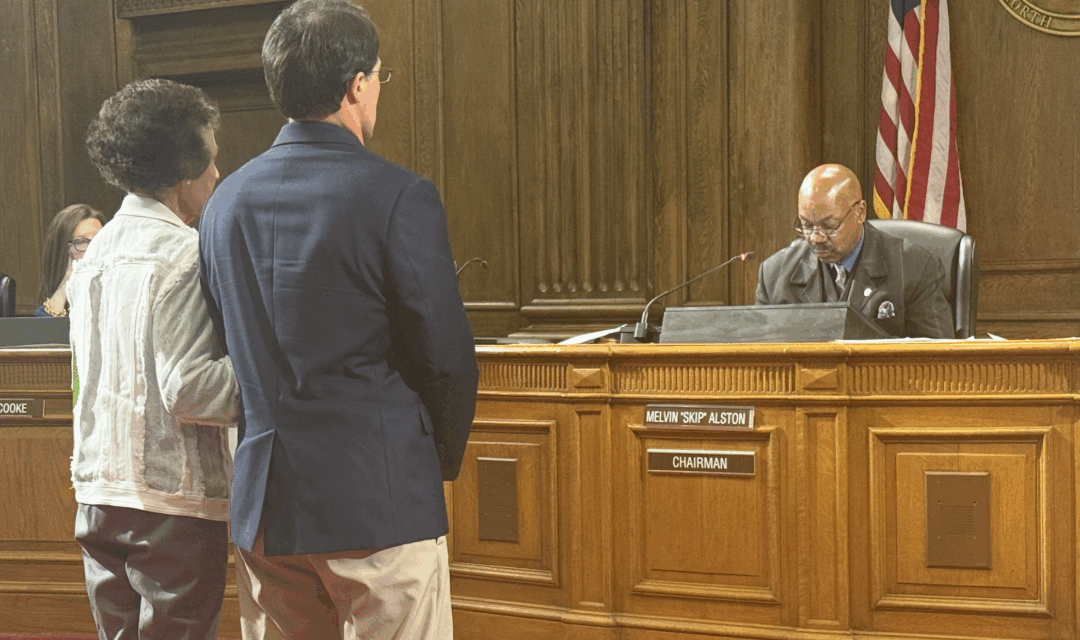At its Thursday, Sept. 4 meeting, the Guilford County Board of Commissioners took time to recognize a man whose name is woven into the fabric of Greensboro’s civic, political and economic life – Jim Melvin.
The commissioners adopted a resolution honoring the longtime mayor, banker and philanthropist, describing him as a historic figure whose leadership and vision helped shape modern Greensboro into the city it is today.
A framed copy of the resolution was presented to his wife, Susan, and his son, Jimbo, at the meeting and the commissioners had some high praise for the former mayor.
The resolution opens with the words, “Edward Samuel ‘Jim’ Melvin passed away on Sunday, August 10, 2025, and is remembered as a stalwart in Greensboro’s legacy.”
Melvin was born in 1933 and raised in Greensboro. He graduated from Greensboro Senior High School – now Grimsley High School – and he earned a business degree from the University of North Carolina at Chapel Hill. He moved on to a career in banking that lasted more than four decades, beginning at North Carolina National Bank, later working at other banks as well.
It was his public service, however, that left the deepest mark on the city.
The resolution notes that he “served with distinction as Mayor of the City of Greensboro from 1971 to 1981, becoming the longest-serving mayor in the city’s history, and the first-ever mayor to enter office by popular election in Greensboro.”
Those years coincided with rapid growth in the city and the county. Melvin was at the center of efforts to expand the city’s footprint, build infrastructure and attract jobs. The commissioners described him as “a steadfast champion for economic development, job creation, and civic innovation, guiding Greensboro through periods of transformative growth.” His leadership, it stated, “helped position Greensboro as a regional hub for business, culture, and higher education, forging strong partnerships between the public and private sectors.”
During that decade, Greensboro landed new industries, grew its downtown and expanded cultural institutions. Melvin was widely seen as someone who could bring competing interests together to focus on the city’s broader future.
The resolution emphasized that his tenure “was marked by an unwavering commitment to fostering opportunity, expanding infrastructure, and enhancing the quality of life for all Greensboro residents.”
Even after leaving elected office, Melvin remained deeply engaged in civic life. The resolution highlighted his service as chairman and CEO of the Joseph M. Bryan Foundation, where he steered philanthropic investments into education, the arts and sports. He also chaired the Greensboro Sports Foundation and played a leading role in the creation of Bryan Park Golf Club and the Bryan Park Soccer Complex – two facilities that continue to attract athletes and visitors from across the region.
Melvin was instrumental in crafting Greensboro’s identity as a sports destination.
The resolution noted his “pivotal involvement with the Greater Greensboro Open, now the Wyndham Championship, along with expanding athletes’ footprints and supporting Greensboro’s sports landscape, [which] helped strengthen the city’s recognition as ‘Tournament Town.’”
Melvin’s civic contributions extended beyond athletics. He was a lifelong member of West Market Street United Methodist Church, and in 1965 he served as president of the Greensboro Jaycees.
Decades later, in 2001, he helped create Action Greensboro, an initiative that continues to support workforce development, education and downtown revitalization. He also helped establish First Horizon Park in 2004, bringing professional baseball to the center of Greensboro.
In addition, Melvin played a central role in forming the Piedmont Triad Partnership, a regional economic development group. One of the most significant long-term efforts tied to his civic work was the Greensboro-Randolph Megasite project, which eventually helped pave the way for large-scale industrial investment in the Triad.
The commissioners put his contributions in simple terms: “His legacy endures as we fondly remember him as ‘Mr. Greensboro’ through the countless lives he touched, the institutions he strengthened, and the enduring spirit of collaboration and progress he instilled in Greensboro.”
And while his civic accomplishments were many, the resolution made it clear that family remained at the heart of his life: “Jim Melvin’s dedication to the city of Greensboro did not outweigh his love for his wife, Susan, their sons Jimbo and Taylor, and close family and friends, to whom he shared his spirit of integrity and passion for community building in education, sports, and the arts.”
The resolution closed with a statement of formal recognition: “The Guilford County Board of Commissioners hereby honors and celebrates the extraordinary legacy of Edward Samuel ‘Jim’ Melvin, recognizing him as a historic figure whose transformative efforts reshaped Greensboro, along with his enduring contributions to the life of the city, and extends its sincere condolences to his family in his passing.”
Chairman of the Guilford County Board of Commissioners Skip Alston read and signed the resolution, which will be entered into the county’s official records as a permanent tribute to Greensboro’s longest-serving mayor.

